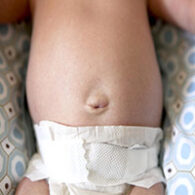A Newborn’s Umbilical Cord and Belly Button
Most first-time parents are understandably worried when they notice bleeding or discharge from their newborn’s belly button. Here is a little guide to help you understand when this is normal and when you need to call your doctor.
In 2006, it was newly recommended that you no longer need to put alcohol on the umbilical cord. A research study found that it really isn’t necessary.
Bleeding
Most newborns will have some oozing of blood from the belly button before and especially after the cord falls off. This can either occur right away or may not appear until a week or more after the cord comes off. It is especially common if the cord comes off within the first week of life from accidental tugging. The blood is usually first noticed during a diaper change when you find some blood on the diaper or T-shirt. This mild oozing of blood can go on for one or two weeks, so don’t worry. You may even see blood with every diaper change. You can also pack some gauze over the belly button under the diaper.
THIS SMALL AMOUNT OF BLEEDING IS NORMAL AND IS NO CAUSE FOR WORRY.
When to Worry
If you see active dripping or pooling of blood that reappears immediately after wiping it away, then you should pack several pieces of gauze over the belly button. If you do not have gauze, use a baby washcloth or toilet paper. Keep the gauze firmly pressed against the belly button under the diaper, and snap a tight outfit onto baby. Wrap him up snugly in a blanket and wait for 15 minutes. Undress him and carefully check for continued active oozing or dripping. If it is stopped, then keep a close eye on it, and keep gauze packed on it for another day. Carefully check once an hour, even overnight. You will see some blood drying on the gauze. There is no need to call your doctor.
If the active dripping or oozing continues after the 15 minutes, then you should call your doctor right away.
Drainage or Discharge
Virtually every belly button will have some yellow or green drainage, both before and after it falls off. It may look like pus, but it is really just mucus. You may notice some on baby’s T-shirt or diaper with every diaper change. This may go on for one or two weeks, so don’t worry. The drainage will eventually stop. For excessive oozing, your doctor can help dry up the cord by applying silver nitrate in the office. This is rarely necessary.
When to Worry
The only time you need to worry is when the cord has become infected. Here is how to tell:
- The drainage has a very foul odor
- The skin around the cord has become very red and may be swollen
- Baby may or may not have a fever
Call your doctor during regular business hours if you suspect this (there is no need to wake the doctor in the middle of the night unless there is a fever over 101).
If you would like to work with a Certified Health Coach during your pregnancy, or postpartum, you can find a Coach in your area.

